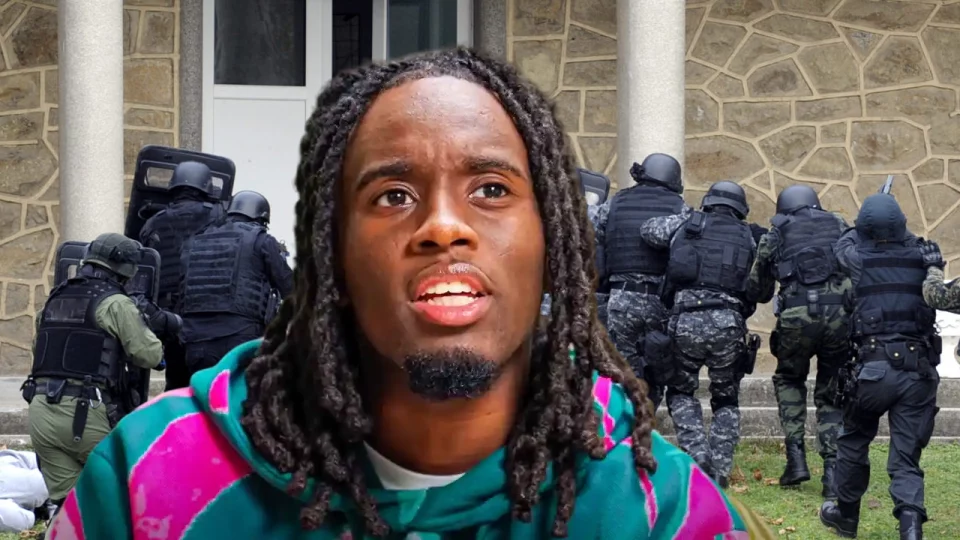The world of live streaming has experienced significant growth over the past decade, with platforms like Twitch providing a stage for talented creators to build substantial followings and create impactful content. One of the biggest names in the streaming world today is Kai Cenat, a 22-year-old content creator who has made headlines for his engaging streams and significant charitable efforts.
However, Kai’s recent 30-day subathon event, dubbed “Mafiathon 2,” was disrupted by a troubling incident that showcases some of the darker aspects of the online streaming community.
Table of Contents
The Incident: Swatting During “Mafiathon 2”
During “Mafiathon 2,” an event intended to bring together Kai Cenat’s fans and raise awareness for his philanthropic mission, an unexpected and dangerous situation unfolded. On a seemingly ordinary day of the subathon, Kai Cenat’s stream was interrupted by a prank that escalated quickly—he was “swatted.” Swatting, an illegal act where someone makes a false report to emergency services to dispatch a SWAT team to a particular location, has become an unfortunate and potentially life-threatening trend targeting public figures and streamers.
Cenat took to Instagram Live to inform his followers about what happened. In the video, he stood outside with a group of people as a SWAT team searched the house. With visible frustration, he described the ordeal: “The house got swatted because somebody called and said false information to troll,” Kai explained. “Twitch just banned me mid-subathon, bro. Twitch just literally banned me, [and] this is not even in my control.”
The streamer expressed disbelief at the situation, emphasizing that he had done nothing wrong. The sudden interruption and temporary Twitch ban added to the chaos, putting both his safety and the continuity of the subathon at risk.
Understanding Swatting and Its Consequences
Swatting is a deeply troubling trend that has gained notoriety within the gaming and streaming communities. This act involves making false reports to law enforcement, leading to heavily armed responses to the targeted location. Not only is swatting illegal, but it is also highly dangerous. In some cases, it has resulted in injury or even death, as officers responding to these high-risk scenarios are prepared for potentially violent situations.
The psychological impact on the victim is profound. Streamers like Kai Cenat who experience swatting often report feelings of vulnerability and frustration, knowing that someone would go to such lengths to disrupt their work and jeopardize their safety. For Cenat, who was in the middle of a significant subathon—a continuous live stream that can last days or weeks—the situation was particularly disruptive.
The incident with Kai Cenat highlights the need for better protective measures and awareness. Law enforcement agencies are increasingly aware of the swatting phenomenon, but preventing it entirely remains challenging due to the anonymity and global reach of online platforms.
Twitch’s Response: A Temporary Ban
Adding to the complexity of the situation, Twitch imposed a temporary ban on Kai Cenat’s channel during the subathon. While the exact reason for this ban has not been made clear, it was an unexpected blow for the streamer. Cenat expressed frustration over the ban, emphasizing that it occurred mid-subathon and was beyond his control. The timing of this ban added to the chaos of being swatted, complicating an already tense situation.
Twitch has faced criticism in the past for its handling of bans and suspensions. Streamers often express concerns about inconsistent enforcement of rules and a lack of clear communication from the platform. In Cenat’s case, the ban was fortunately temporary, and he was able to resume his subathon shortly after. He took to Twitter to reassure his followers, writing: “GOT BANNED AND SWATTED IN THE LAST 30 MINS BUT WE BACK 140,000 SUBS HIT THANK THE LORD BLESSED #Mafiathon2.”
The Significance of “Mafiathon 2” and Kai Cenat’s Charitable Efforts
“Mafiathon 2” was more than just an ordinary subathon. It was a platform for Kai Cenat to connect with his community while raising awareness and funds for an important cause. In a statement shared on Instagram before the event began, Cenat announced that 20% of the profits from the 30-day stream would go toward building a school in Nigeria.
“I visited Nigeria not too long ago and I absolutely loved it,” Cenat wrote. “I say that to say this for the next 30 days while I’m streaming, 20% of all revenue will be going straight to the school that I am still currently building for the kids of Mokoko.” This commitment reflects Cenat’s dedication to using his platform for positive change. His visit to Nigeria left a profound impact on him, inspiring him to contribute to education and infrastructure development in the region.
Charity and philanthropy are not new in the world of streaming. Many content creators leverage their influence to support various causes, whether through charity streams, fundraising events, or direct donations. Kai Cenat’s decision to allocate part of his subathon’s revenue to building a school underscores the potential for streaming platforms to be used as tools for good, fostering global connections and making tangible differences in communities.
